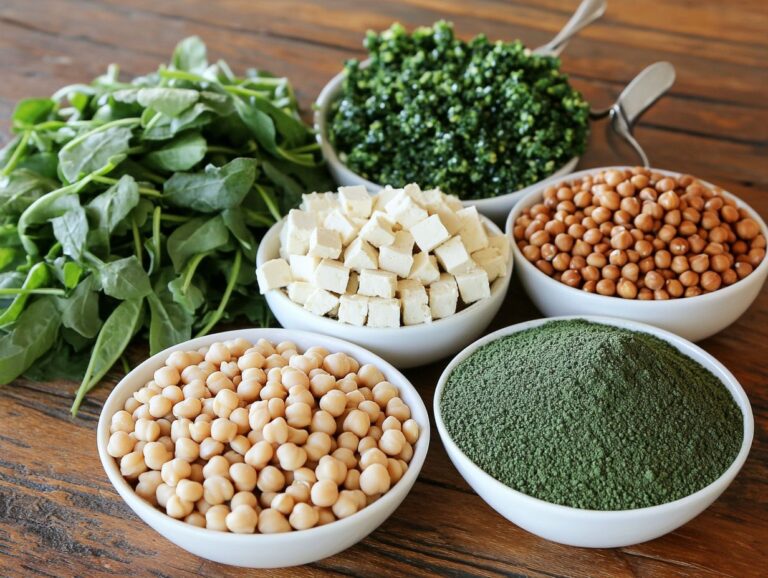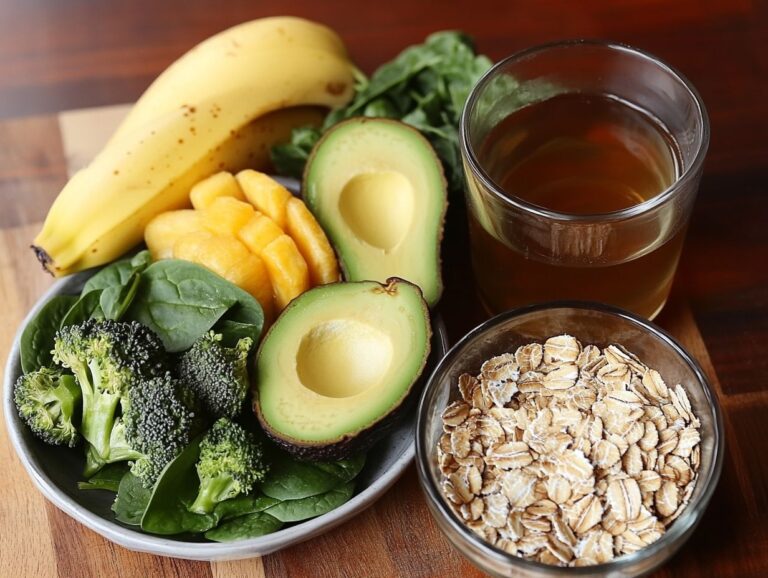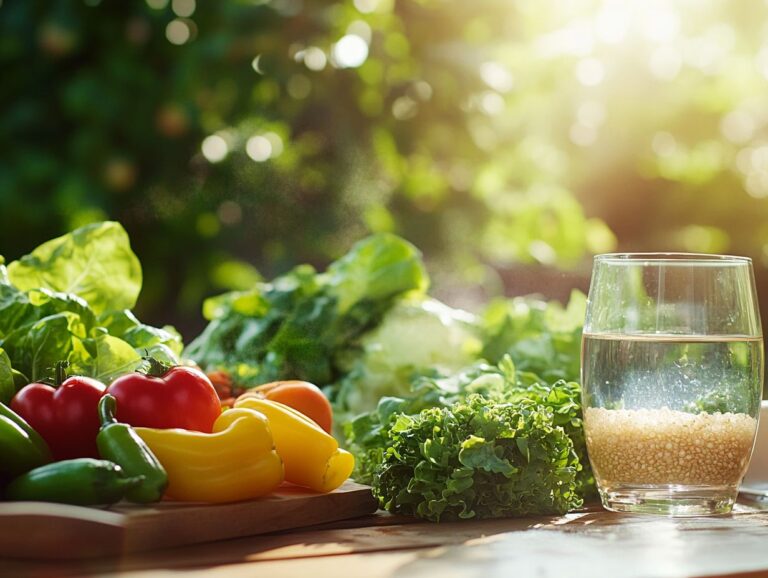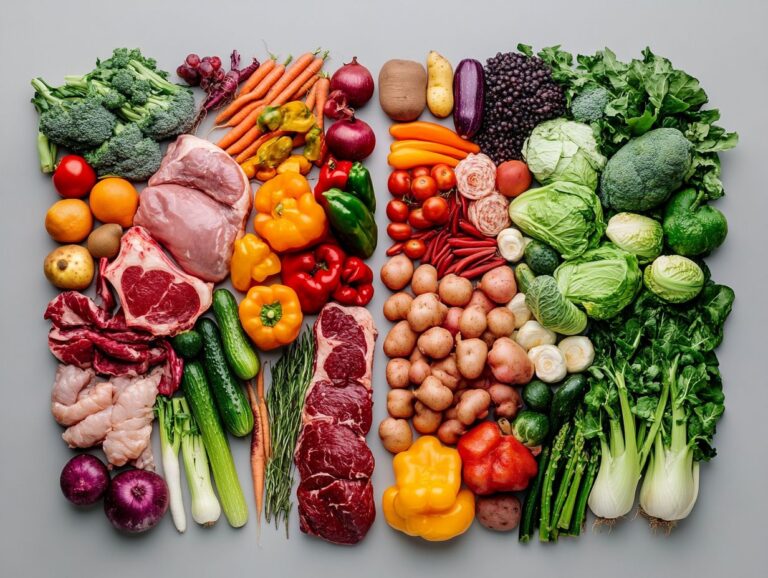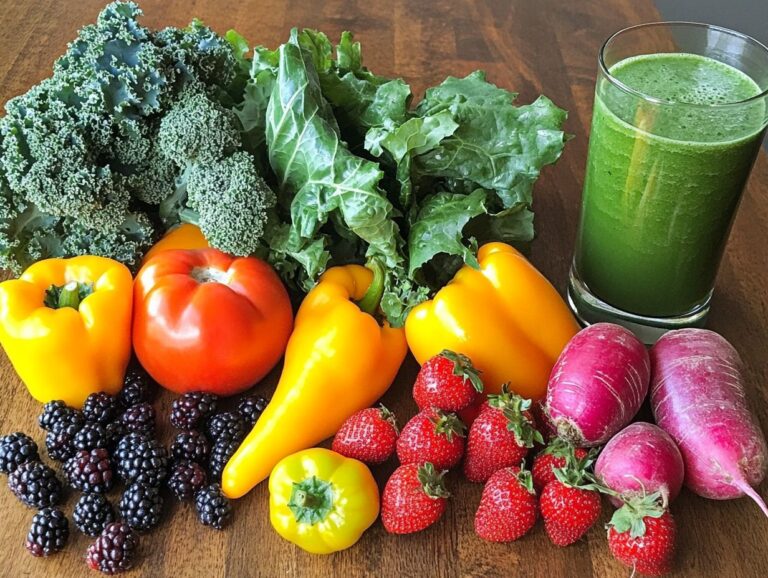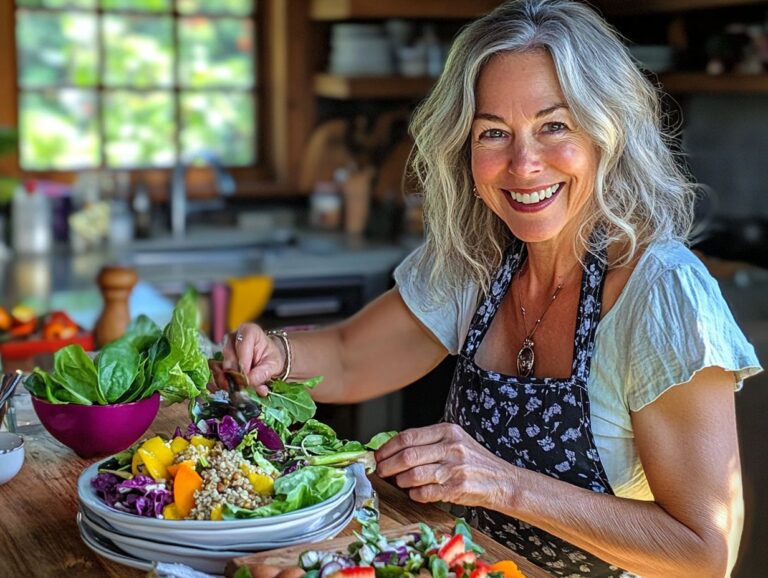Adopting a vegan diet can be an enriching experience; however, many individuals report challenges related to hunger, satiety, and satisfaction. To thrive on a plant-based diet, it is essential to learn how to balance your meals to ensure you feel full and satisfied by incorporating key components such as protein, fiber, and healthy fats. Key factors to consider include consuming adequate protein, nutrient-dense foods, healthy fats, and fiber. Explore vegan foods that nourish both your body and your taste buds, focusing on whole foods and mindful eating to address your nutritional needs!
How to Stay Satisfied on a Vegan Diet?
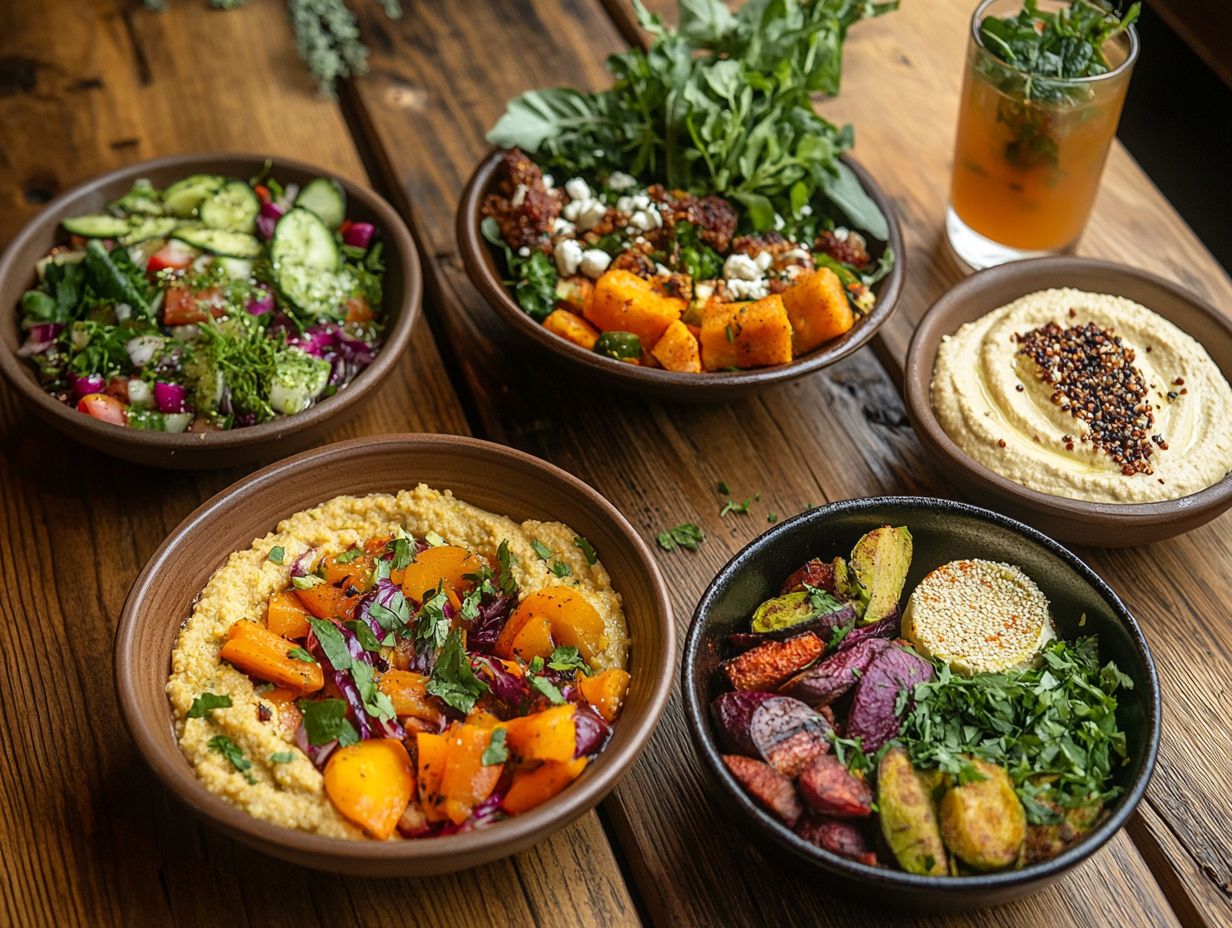
Following a vegan diet requires careful attention to protein intake, nutrient-rich foods, mindful eating practices, and understanding hunger cues.
By prioritizing whole foods such as legumes, whole grains, fruits, and vegetables, individuals can meet their nutritional needs while effectively responding to hunger cues and managing satiety.
Understanding the roles of healthy fats, fiber, and complex carbohydrates can aid in meal planning, ensuring that meals are satisfying and contributing to overall emotional and physical well-being.
1. Eat Enough Protein
Consuming adequate plant proteins is essential for maintaining muscle, supporting energy levels, and managing appetite throughout the day in a vegan diet. Various plant-based sources of protein can help achieve these goals.
Legumes, such as lentils and chickpeas, are rich in protein and fiber, which promotes a feeling of fullness. Tofu and tempeh can be marinated and grilled or sautéed to enhance their flavor while providing additional protein. Incorporating these foods into salads, stir-fries, and soups can help meet daily protein requirements.
2. Incorporate Nutrient-Dense Foods
As a vegan, consuming nutrient-rich foods is essential for preventing deficiencies and meeting your overall nutritional needs. Opting for whole foods such as fruits, vegetables, and whole grains can significantly enhance the quality of your diet.
These foods are rich in essential vitamins and minerals, offering a variety of health benefits and reducing the risk of nutrient deficiencies. Green leafy vegetables and legumes are particularly beneficial for obtaining iron and calcium, both of which are vital for bone health and blood structure, while also supporting nutrient needs and absorption.
Additionally, omega-3 fatty acids from sources like flaxseeds and walnuts are important for brain health and can be part of cooking without oil strategies. Incorporating fortified options, especially for vitamin B12, can also help maintain energy levels.
By adopting this holistic approach, you can ensure well-balanced meals and a healthy nutrient profile.
3. Include Healthy Fats in Your Meals
Incorporating healthy fats into meals enhances flavor, promotes satiety, and supports overall well-being on a vegan diet by helping control appetite and manage portion sizes. These healthy fats can be sourced from avocados, nuts, and seeds, and they can be used in various ways in daily meals.
For instance, creamy avocado can be blended into smoothies or used as a spread to provide a rich texture instead of oils, aiding in hydration levels and energy retention. Nuts can be sprinkled over salads or mixed into energy balls to add a crunchy texture, which helps reduce cravings, aids in managing emotional eating, and boosts overall well-being. Similarly, chia or flax seeds can be included in puddings or used as toppings to provide omega-3 fatty acids that support heart health and nutrient absorption.
4. Increase Your Fiber Intake
Incorporating more fiber into your diet is one of the best ways to feel full while following a vegan lifestyle, as fiber-rich foods promote satiety and support digestive health.
A diverse array of fiber-rich options, including whole grains, legumes, fruits, and vegetables, can significantly enhance your overall well-being. These foods are low in calories and high in nutrients, making them effective for weight loss by inducing a feeling of fullness and supporting a healthy weight.
Whole grains like oats and quinoa provide healthy sources of complex carbohydrates, while legumes such as lentils and chickpeas offer a good amount of protein, fiber, and essential vitamins. Additionally, fruits and vegetables are abundant in antioxidants, fiber, and other nutrients, which contribute to gut health and reduce the risk of chronic diseases.
By increasing your fiber intake and adjusting your eating habits, you can enjoy a more satisfying and healthier eating experience.
What Are Some High-Protein Vegan Foods?
High-protein vegan foods can effectively meet the nutritional needs of individuals following plant-based diets, ensuring the intake of essential amino acids. A diverse range of these foods is available to provide sufficient protein without relying on animal products.
1. Legumes
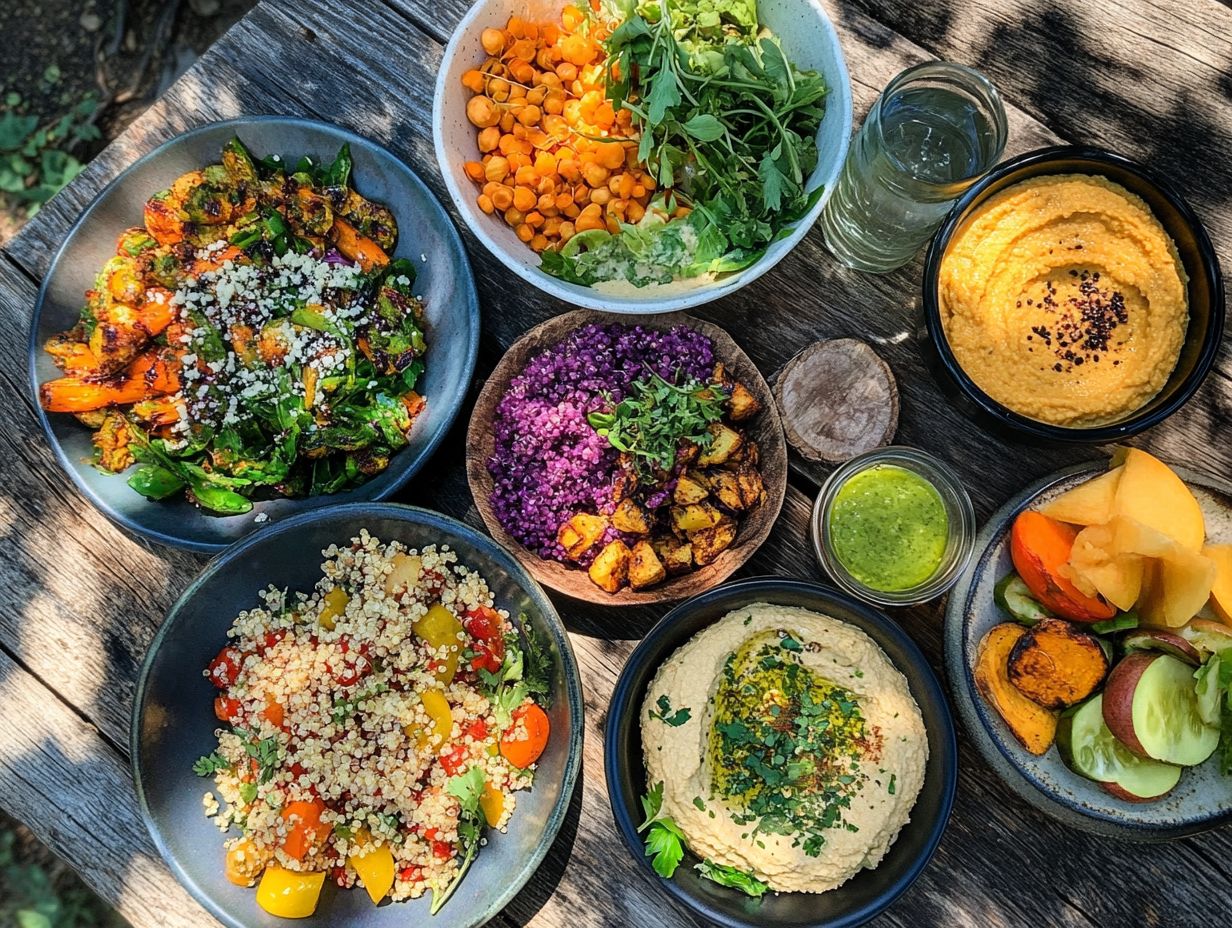
Legumes, such as lentils, chickpeas, and black beans, are abundant in protein, fiber, and essential nutrients, making them some of the best foods for a vegan diet. They support muscle health, aid digestion, help maintain energy levels, and address appetite control throughout the day.
Their versatility allows them to be incorporated into a wide variety of recipes, including soups, salads, and stews. This adaptability makes it easy to include legumes in the diet, as they can be enjoyed in many forms, enhancing both texture and flavor while contributing to balanced meals.
When included in daily meals, legumes can help individuals feel fuller for longer, reducing the likelihood of reaching for unhealthy snacks. Additionally, these foods can significantly improve the nutritional profile of a diet.
Ultimately, beans and peas are an excellent way to fuel the body.
2. Tofu and Tempeh
Tofu and tempeh are two of the most popular plant-based proteins, offering a rich source of protein and healthy fats that make them ideal for satisfying meals on a vegan diet.
These versatile ingredients not only provide essential amino acids but also contribute dietary fiber, along with various vitamins and minerals, enhancing their overall nutritional value.
In cooking, tofu can be easily incorporated into soups, stir-fries, and salads due to its ability to absorb flavors. In contrast, tempeh’s nutty taste and firm texture make it perfect for grilling or serving as a meat substitute in various dishes.
By including these plant-based proteins in their meals, individuals can enjoy balanced nutrition that supports heart health, promotes muscle maintenance, and aids in meal frequency management. Both tofu and tempeh also serve as excellent bases for marinades and sauces, enriching dishes without compromising dietary goals and enabling healthy snacks preparation.
3. Nuts and Seeds
Nuts and seeds are excellent sources of healthy fats and are rich in protein, making them ideal choices for nutritious snacks and meal additions in a vegan diet.
The wide variety of these nutrient-dense, calorie-dense foods can significantly enhance overall dietary quality and satisfaction. They are packed with essential vitamins and minerals such as vitamin E, magnesium, and zinc, which support various bodily functions and prevent nutrient deficiencies.
For instance, almonds and walnuts not only provide a crunchy snack but also contain omega-3 fatty acids that promote heart health and assist in managing stress eating. Meanwhile, chia and flax seeds offer a fantastic source of fiber, benefiting digestive health.
When incorporated into smoothies, salads, or used as toppings, these foods enhance the texture and flavor of meals, making them more enjoyable and satisfying while helping individuals meet their daily nutritional and thirst signals.
4. Quinoa
Quinoa is a high-protein grain that serves as a complete source of essential amino acids, making it an excellent protein option for a vegan diet. This nutrient-rich food is packed with vitamins and minerals, including magnesium, iron, calcium, and B vitamins.
Its unique texture and mild flavor enable it to be used in a variety of recipes, ranging from salads and stir-fries to soups and casseroles. Additionally, quinoa is a great substitute for rice or pasta, providing versatile meal preparations that cater to diverse tastes while contributing to a healthy meal structure.
What Are Some Nutrient-Dense Vegan Foods?
Nutrient-dense vegan foods are essential for optimal health and can help prevent nutrient deficiencies, as they supply the necessary micronutrients, such as vitamins and minerals, to support overall well-being.
1. Leafy Greens
Leafy greens, such as spinach, kale, and Swiss chard, are among the most nutrient-dense vegan foods, packed with vitamins, minerals, and antioxidants. Incorporating these vibrant vegetables into your diet offers numerous health benefits that extend beyond mere nutrition, ultimately enhancing your overall quality of life and helping manage boredom eating.
For instance, leafy greens are high in fiber, which aids digestion and can contribute to maintaining a healthy weight. This is especially beneficial for individuals struggling with emotional eating, as the nutrients found in these greens can improve mood and energy levels, helping to reduce cravings and prevent unhealthy snacking.
Additionally, leafy greens are incredibly versatile and can be used in a variety of culinary applications, whether in salads, smoothies, or as part of a hearty main dish. This versatility makes it easier to cultivate a healthy relationship with food.
2. Berries
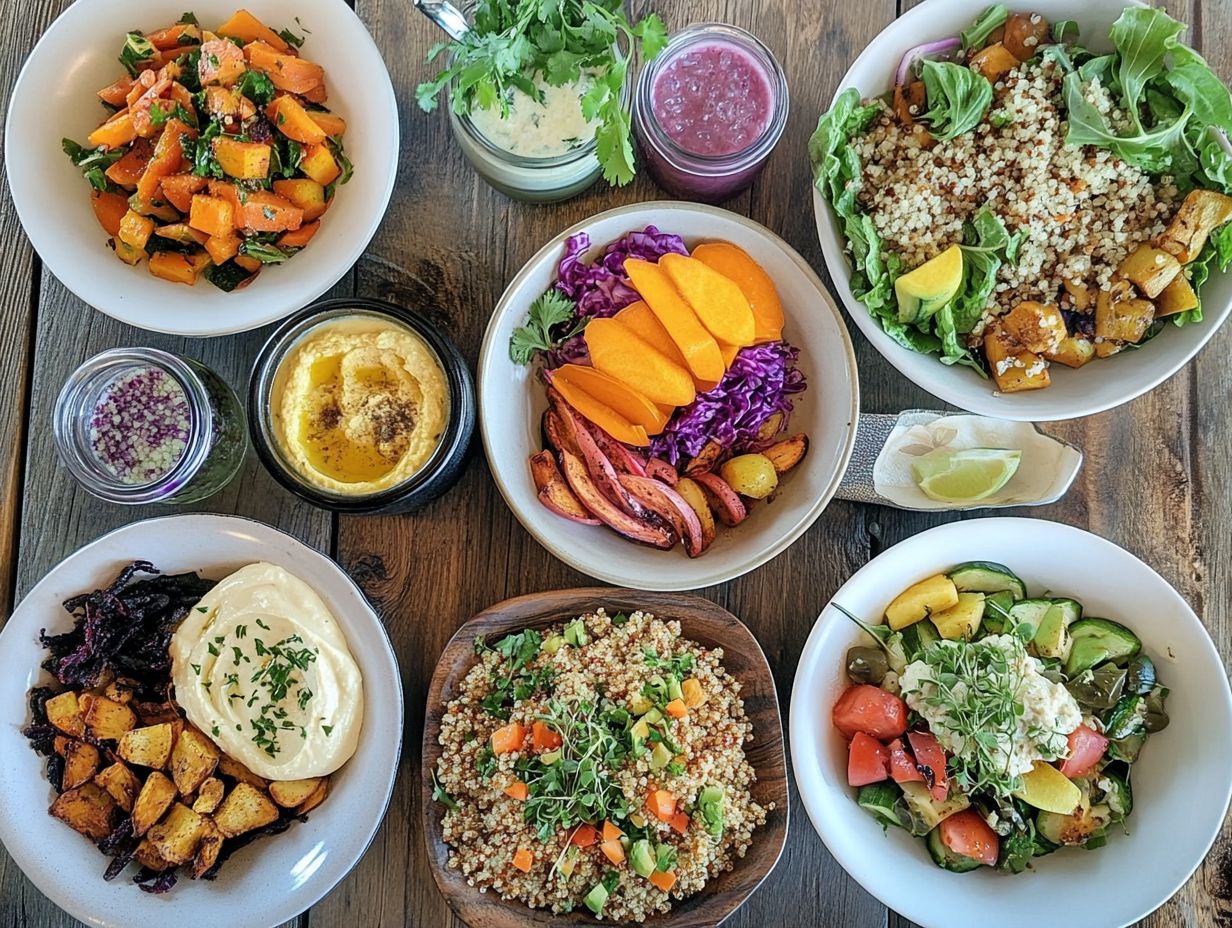
Berries are delicious, nutrient-dense foods rich in antioxidants, vitamins, and minerals, making them an excellent choice for vegans seeking essential nutrients.
High in dietary fiber, berries promote digestive health and create a feeling of fullness, which makes them a great option for those looking to manage their weight and improve their hydration.
Their vibrant colors and sweet flavors can easily enhance a wide range of meals, from breakfast smoothies to gourmet desserts, ensuring a delightful variety of tastes along with numerous health benefits.
The anti-inflammatory properties of these fruits can support heart health, boost the immune system, improve skin health, and aid in nutrient absorption. Incorporating a variety of berries into every meal not only adds nutritional value but also enhances the overall dining experience.
3. Avocado
Avocado’s high fat and fiber content make it one of the healthiest fruits to include in a vegan diet, as it is both nutrient-dense and satiating, aiding in appetite control.
It offers a wide variety of essential nutrients, including important vitamins and minerals such as potassium, vitamin E, and iron, which are vital for meeting the body’s nutritional needs and ensuring proper functioning.
The creamy texture and healthy fat content of avocados make them an excellent ingredient for smoothies, guacamole, salads, or as a salad dressing, contributing to satiety and helping manage portion sizes.
Including avocados in a meal plan supports a well-balanced vegan diet by enhancing nutrient absorption, providing healthy energy, and fulfilling essential nutritional needs.
4. Whole Grains
Whole grains are an excellent source of complex carbohydrates and fiber, making them a nutritionally dense component of a vegan diet. Incorporating these grains into daily meals not only enhances the overall flavor but also helps sustain energy levels and satisfies hunger cues throughout the day.
The fiber content in whole grains plays a crucial role in promoting a feeling of fullness, or satiety, which aids in appetite management and reduces the risk of overeating. Additionally, they supply essential vitamins and minerals that can help meet a person’s nutritional and nutrient needs.
What Are Some Healthy Fats to Include in a Vegan Diet?
Healthy fats play an essential role in a balanced vegan diet by providing crucial nutrients, enhancing flavor, and supporting overall health, especially in maintaining healthy weight and energy levels.
1. Avocado
Avocado is a nutrient-dense fruit that is rich in healthy fats and is commonly used in salads, smoothies, and spreads within a vegan diet. This fruit is abundant in vitamins such as E, K, and C, as well as minerals like potassium and calcium.
The benefits of avocados include improved heart health, enhanced nutrient absorption, and the ability to provide healthy fats and protein. Their buttery flavor and creamy texture make them versatile for various culinary applications.
- They can be blended into smoothies for a creamy base, satisfying hunger cues,
- diced into salads for a crunchy contrast,
- or spread on toast with toppings ranging from tomatoes to poached eggs.
More adventurous cooks often incorporate avocados into desserts, such as chocolate mousse or sorbet, showcasing their ability to complement sweet flavors while maintaining a healthful profile and adding essential amino acids.
2. Nuts and Seeds
Nuts and seeds are excellent sources of healthy fats and protein, offering numerous health benefits while serving as convenient snacks for a vegan diet. Incorporating a diverse range of nuts, such as almonds, walnuts, and cashews, along with seeds like chia, flax, and pumpkin, enriches vegan diets and helps manage emotional eating.
As part of the vegan food pyramid, the healthy fats and protein from nuts and seeds provide higher-calorie options for those who require them. For instance, almonds are rich in vitamin E and magnesium, while walnuts are a great source of omega-3 fatty acids, which are essential for heart health and help manage energy levels.
These nutrient-dense foods can easily be added to smoothies, salads, or oatmeal to enhance their nutritional value and assist in meeting nutritional needs. Additionally, homemade energy bars or trail mix made with your favorite nuts and seeds offer a satisfying and nutritious snack option that provides sustained energy throughout the day and aids in appetite control.
3. Olive Oil
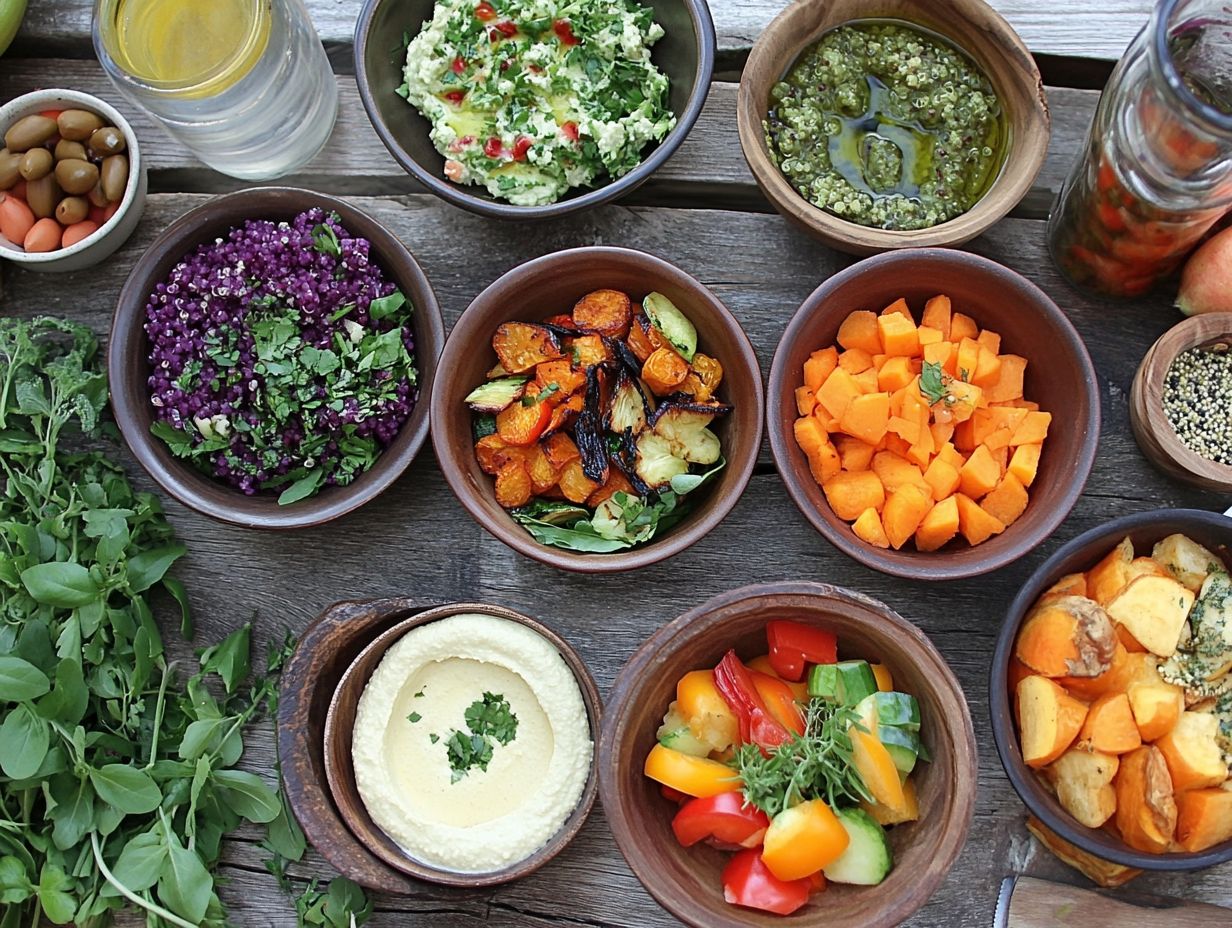
Olive oil is a staple healthy fat in a vegan diet and is considered one of the healthiest oils for cooking and dressings. The monounsaturated fats found in olive oil are beneficial for heart health, help manage cholesterol levels, and support the integration of plant-based foods.
When included in vegan diets, olive oil can enhance the flavor of almost any dish without the need for excessive spices or additives. This quality is particularly important for individuals who may lack experience in meal preparation, as the oil can elevate flavor profiles, aid in nutrient absorption, and increase overall enjoyment.
Additionally, the antioxidants in olive oil can help the body combat oxidative stress, making it a great choice for those looking to improve their overall health and maintain hydration levels.
4. Coconut Oil
Coconut oil is a popular source of healthy fats in the vegan diet, recognized for its distinctive taste and potential health benefits. It can be utilized in various cooking methods, including frying and sautéing vegetables, as well as baking desserts.
Rich in medium-chain triglycerides (MCTs), coconut oil may help boost metabolism and provide a quick source of energy, making it appealing to individuals aiming to maintain an active lifestyle and fulfill calorie-dense meal requirements.
When integrated into a balanced vegan diet, it can enhance the absorption of fat-soluble vitamins from other plant-based foods. Additionally, coconut oil serves as a healthy substitute for butter or margarine and can elevate the flavor of both sweet and savory dishes, making it a staple in many vegan households and aiding in stress eating management.
How Much Fiber Should You Aim for on a Vegan Diet?
A daily fiber intake of 25 to 38 grams is generally recommended for those following a vegan diet to promote digestive health, overall well-being, and maintain satisfying meals.
What Are Some High-Fiber Vegan Foods?
High-fiber vegan foods are essential for promoting healthy digestion, maintaining satiety, and managing hunger cues, while also supplying vital vitamins and minerals necessary for a balanced diet.
1. Whole Grains
Whole grains are rich in fiber, nutrients, and complex carbohydrates, making them an essential component of any high-fiber vegan diet. Examples of whole grains include oats, quinoa, brown rice, and barley, which support hydration and nutrient absorption.
These grains provide vital vitamins and minerals that are crucial for overall health, and help achieve balanced meals. They enhance digestion and reduce the risk of chronic diseases such as heart disease and diabetes.
Whole grains can be incorporated into a variety of meals, such as:
- a savory breakfast porridge made with oats and topped with berries,
- a quinoa salad featuring mixed greens and roasted vegetables,
- a side of brown rice served with stir-fry,
- a hearty barley soup with carrots and celery,
- a nutrient-dense meal with chickpeas and tofu.
2. Fruits and Vegetables
Fruits and vegetables are not only delicious but also nutrient-rich sources of fiber and essential micronutrients that play a crucial role in a high-fiber vegan diet. Incorporating a diverse array of these colorful foods into one’s daily meals can significantly enhance overall health, help manage emotional eating, and support hydration.
For instance, berries are packed with antioxidants and can easily be included in breakfast smoothies or yogurt. Leafy greens like spinach and kale make excellent additions to salads and wraps. Root vegetables such as carrots and sweet potatoes can be roasted or steamed to create a satisfying side dish.
Regularly consuming a wide variety of fruits and vegetables can lead to improved digestion, increased energy levels, better appetite control, and a greater sense of fullness throughout the day.
3. Legumes
Legumes, such as beans, lentils, and peas, are among the best sources of fiber and provide essential protein and nutrients in a vegan diet. These nutrient-dense foods contribute to digestive health due to their high fiber content and are versatile enough to be used in a wide range of dishes, including meals with tempeh to meet essential amino acids intake.
Incorporating legumes into meals can enhance the nutritional value of stews, salads, spreads, and dips. Additionally, their low glycemic index makes them valuable for maintaining stable energy levels and can help in meal adjustments for better eating habits.
For those following a high-fiber vegan diet, legumes help meet daily fiber requirements while allowing for a variety of delicious recipes.
4. Chia Seeds
Chia seeds are exceptionally high in fiber, omega-3 fatty acids, and other essential nutrients, making them one of the best sources of fiber for a high-fiber vegan diet. They promote heart health, aid digestion, and help manage boredom eating, significantly increasing daily fiber intake as part of a balanced diet.
Chia seeds can be incorporated into meals in various ways beyond simply adding them to salads or smoothies. For example, you can soak them in almond milk to create a pudding, add them to baked goods to enhance texture and nutrition, or utilize their thickening properties in soups or sauces, making them a valuable addition to any meal structure.
